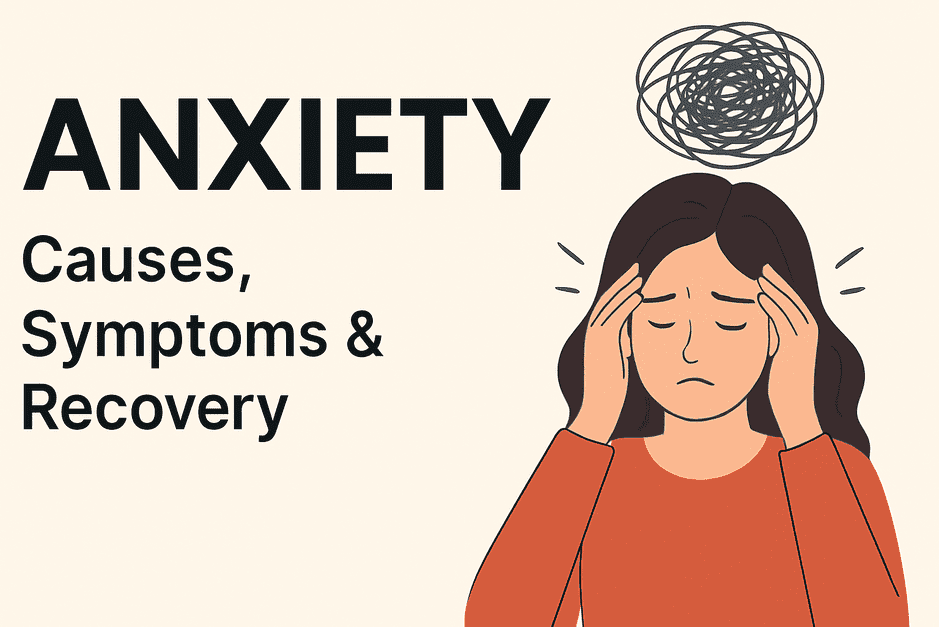

What is Anxiety?
Anxiety is a natural feeling of fear, nervousness, or worry. It is a part of our body’s response to stress or danger. Everyone feels anxious sometimes before exams, interviews, or important events. But when anxiety becomes too much or doesn’t go away, it may turn into a problem.
In medical terms, anxiety is a mental health condition that can affect your thoughts, emotions, and even your body. People with anxiety may feel scared or restless without any clear reason. Their mind keeps thinking about bad things that might happen, even if everything is fine.
There are many types of anxiety, such as general anxiety disorder, panic disorder, social anxiety, and phobias. While a little anxiety is normal and helpful, too much of it can disturb your daily life, work, and relationships. That’s why it’s important to understand what is anxiety and how to deal with it.
How anxiety occurs
Anxiety can happen due to many reasons. It often starts when your brain feels that you are in danger or under pressure. Your body reacts by getting ready to fight or run away. This is called the “fight or flight” response. It’s helpful in real danger, but in anxiety, this system gets activated even without a real threat.
Here are some common causes of anxiety:
- Stress from school, work, or personal life
- Family problems or relationship issues
- Past trauma like abuse or accidents
- Lack of sleep and unhealthy lifestyle
- Medical conditions like thyroid, heart problems
- Use of alcohol, drugs, or too much caffeine
- Genetics – anxiety can run in families
Also, negative thinking habits, fear of failure, or too much use of social media can increase anxiety. For some people, anxiety comes suddenly. For others, it builds up slowly over time.
Understanding the reason behind your anxiety is the first step toward healing.
Problems caused by anxiety
Anxiety doesn’t just affect your mind – it also affects your body and daily life. If not managed, anxiety can lead to several serious problems.
Emotional Problems:
- Constant worry or fear
- Feeling tense or jumpy
- Trouble focusing or remembering things
- Feeling like something bad is going to happen
Physical Problems:
- Fast heartbeat (palpitations)
- Sweating or trembling
- Headaches or body pain
- Trouble sleeping (insomnia)
- Upset stomach or digestion issues
- weight gain and weight loss problem
Social & Lifestyle Problems:
- Avoiding people or public places
- Struggles at work or school
- Losing interest in hobbies
- Feeling tired all the time
Over time, untreated anxiety may lead to depression, substance abuse, or other mental health issues. That’s why it’s important to take it seriously and not ignore the signs.
How to identify anxiety
Many people don’t realize they have anxiety because the signs can be different for everyone. Also, it may feel like just stress or tiredness. But there are some common signs you can look for:
Common Symptoms of Anxiety:
- You feel nervous or tense most of the time
- You get scared easily, even without a reason
- Your heart beats fast or you sweat a lot
- You overthink small problems
- You avoid going out or meeting people
- You find it hard to relax or enjoy anything
- You often feel like crying or get irritated easily
If these signs happen often, last for weeks, and affect your life, you might be dealing with anxiety.
Keeping a daily journal of how you feel can help you notice patterns. You can also talk to a trusted person or a doctor for guidance.
how to cure anxiety
The good news is – anxiety can be treated. With the right steps, support, and patience, most people recover and live healthy, happy lives.
Here are some ways to manage and reduce anxiety:
1. Lifestyle Changes
- Get 7–8 hours of sleep
- Exercise regularly (walking, yoga, etc.)
- Avoid alcohol, smoking, and too much caffeine
- Eat healthy and drink enough water
2. Relaxation Techniques
- Deep breathing exercises
- Meditation and mindfulness
- Listening to calming music
- Spending time in nature
3. Therapy
- Cognitive Behavioral Therapy (CBT) helps to cure anxiety and change negative thoughts
- Talking to a counselor or therapist helps you express your feelings
4. Medicines
In some cases, doctors may suggest medicines to manage anxiety. These should only be taken with a doctor’s advice and regular checkups.
Healing takes time, but small changes daily can lead to big results.
Can i cure anxiety on your own?
Yes, in many cases, you can fight anxiety yourself – especially if it is mild to moderate. Self-help methods work well when practiced regularly and with a positive mindset.
Here are some ways to help yourself:
- Talk about your feelings to friends or family
- Write a journal about your thoughts and triggers
- Limit social media, especially before sleeping
- Create a routine – regular meals, sleep, and work
- Practice gratitude – write 3 good things daily
- Avoid negative people or stressful situations if possible
- Learn to say “no” when things become too much
Also, learning about what is anxiety through books, videos, or trusted websites can give you confidence.
But remember – if your anxiety feels too heavy, do not hesitate to ask for help. Self-healing is great, but there’s no shame in getting support.
When should you consult a doctor?
You should see a doctor or mental health expert when:
- Your anxiety doesn’t go away even after many weeks
- It affects your work, studies, or relationships
- You have panic attacks or feel like you can’t breathe
- You feel sad, hopeless, or angry all the time
- You can’t sleep, eat, or enjoy life anymore
- You think about hurting yourself or ending your life
Doctors and therapists are trained to understand your problem and offer the right support. You can talk to:
- A general physician
- A psychiatrist (for medicine and mental health diagnosis)
- A psychologist or counselor (for therapy)
Don’t wait for things to get worse. Early help leads to faster recovery and better mental health.
Here is a simple table outlining a daily routine and lifestyle tips that can help improve anxiety naturally:
| Time / Habit | Suggestion | Purpose |
|---|---|---|
| Morning (Wake-up) | Take deep breaths and meditate for 5 minutes | Start your day with calmness and clarity |
| Breakfast | Eat a healthy meal – oats, fruits, dry fruits | Stabilize blood sugar and nourish your body |
| During the Day | Go for a walk or light exercise for 10-15 minutes | Release endorphins and reduce stress |
| Social Interaction | Talk to family or friends | Emotional support and reduce loneliness |
| Screen Time | Limit social media and phone usage | Avoid overthinking and reduce mental clutter |
| Lunch | Eat a balanced diet – green veggies, protein, carbs | Provide energy for body and mind |
| Evening | Do yoga, read a book, or listen to music | Relax your mind after a long day |
| Dinner | Eat early and keep the meal light | Improve digestion and sleep quality |
| Before Bed | Practice meditation or write positive thoughts | Sleep better and calm your mind |
Disclaimer:
This article is intended for informational purposes only and should not be considered as medical advice. If you are experiencing symptoms of anxiety or suspect you may be dealing with a mental health issue, please do not attempt to self-diagnose or self-treat.
Mental health conditions can vary greatly from person to person, and only a qualified healthcare professional can provide an accurate diagnosis and appropriate treatment. Always consult a licensed doctor, psychologist, or psychiatrist before making any decisions regarding your mental well-being. Your health is important — seek professional help when needed.




